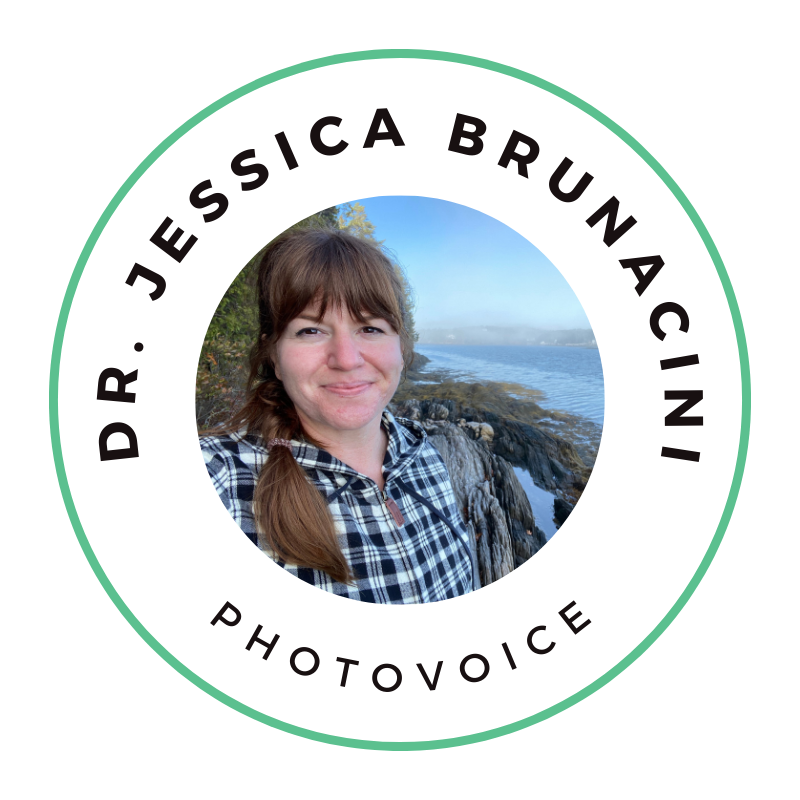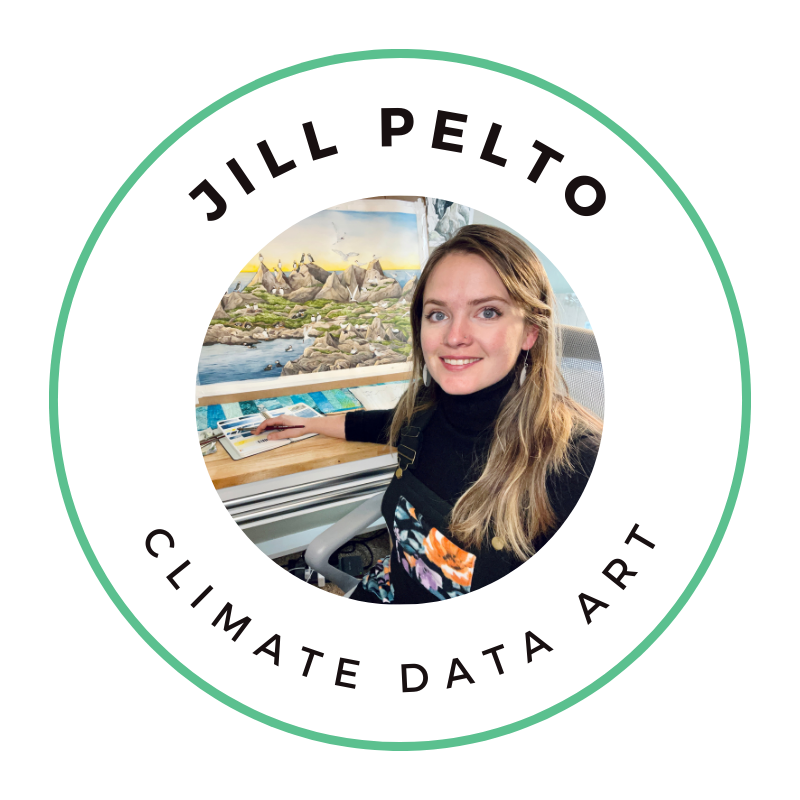
- This event has passed.
Visualizing Change: Blending art and science to engage communities on climate change
November 30, 2023 @ 1:00 pm - 2:30 pm

Mark your calendar and get ready to be inspired! Join us at this upcoming virtual workshop on November 30th from 1:00pm-2:30pm, where we will be joined by guest speakers, Dr. Jessica Brunacini, a social scientist and community engagement specialist, and Jill Pelto, a climate artist and science communicator. Together, they are joining forces to guide us on an exploration of two innovative community engagement methods: Photovoice and Climate Data Art, that blend art and science to engage communities on climate change.
The free virtual workshop will provide opportunities to participate and engage in creative activities and meaningful discussions about fostering a deeper understanding of the human dimensions of climate change within your community.
- You will gain valuable insights into practical applications of Photovoice and Climate Data Art
- You will learn how these methods can play a pivotal role in encouraging community-level awareness, facilitating knowledge exchange, and garnering support for climate adaptation, all of which are crucial steps in preparing for and mitigating the effects of a shifting climate.
- You will leave inspired and with resources and support to help you enhance your community engagement efforts.
FUN FACT: Jill Pelto’s artwork is featured in the National Climate Assessment. The US Global Change Research Program issued a call for art with the understanding that, together, art and science move people to greater understanding and action. The call received more than 800 submissions, and the final collection features the work of 92 artists. Their work, which represents all 10 NCA regions, offers a powerful depiction of climate change in the United States—its causes and impacts, as well as the strength of our collective response.
EVENT DETAILS:
Save your spot and RSVP today!
VISUALIZING CHANGE: Blending Art And Science To Engage Communities On Climate Change
November 30, 2023 | 1:00pm-2:30pm | FREE Webinar (via zoom)
PRE-EVENT ACTIVITY INSTRUCTIONS:
Once you are all set with your registration for the webinar, we’ve prepared two simple and imaginative activities for you to do before the workshop. Your engagement in these pre-event activities will enhance the dynamic exchange we’ll have during the workshop.
To get started, simply click on the blue button above to view detailed instructions. We encourage you to bring your creations from the pre-event activities to share and discuss in the workshop. If you run out of time, don’t fret – you can still participate in the workshop, and there’s no pressure to showcase your masterpieces if you prefer not to.
Click the Blue Button above to View the Pre-Event Activity Instructions
OR CLICK HERE TO DOWNLOAD and PRINT
GUEST SPEAKERS:


Dr. Jessica Brunacini is a social scientist and community engagement specialist whose work focuses on coastal resilience. For the past 15 years, Jessica has worked on addressing the impacts of climate change alongside local, state, and federal agencies, tribal nations, regional planning organizations, academic institutions, international NGO’s, non-profits, and community groups, as well as with individuals at the neighborhood level. Recently, she completed her dissertation research in collaboration with the Wells National Estuarine Research Reserve. Jessica used a participatory method called Photovoice to explore the social dimensions of climate change adaptation, including how people’s attachment to coastal places shapes their experiences with and responses to sea level rise impacts. The results demonstrate that coastal residents know that dramatic change is underway and that they are eager to be involved in the decision-making processes that affect the places they care about. Jessica’s work is founded on the belief that incorporating local knowledge, values, and aspirations into planning and decision-making processes makes coastal resilience plans more responsive to community’s needs and more reflective of their hopes for the future.
ABOUT PHOTOVOICE:
Photovoice is a participatory research method and community engagement tool that is used to explore community knowledge, perceptions, and aspirations, particularly with people who typically do not have a voice in planning or decision-making processes. The Photovoice process asks participants to take photographs in response to a question that is meaningful to the community. They write short narrative statements about their photographs and then participate in group discussions to identify common themes that emerge from their photos. Finally, a public exhibit of selected photographs is held to engage with the broader community, including elected officials and other decision-makers.
Jessica Brunacini conducted a Photovoice project with community members from two coastal neighborhoods in the town of Wells to explore place attachment in times of change. Place attachment shapes the way we think about the past, present, and future of the places that are special to us. It’s a sort of lens that informs how we understand and value a place, how we experience change, how we perceive risk, and how we decide what is important to protect for future generations. Participants in the project took photos in response to the question, “When it comes to [this place], what do you care about most?” Although it was not framed as a climate change project, concern about the impacts of sea level rise emerged as a key theme throughout the Photovoice process. The process elicited valuable local knowledge in the form of observations of change over time and lived experience with sea level rise impacts. These results suggest that Photovoice can be a powerful approach to exploring the impacts of climate change with communities who care for and are concerned about the future of coastal places.

Photovoice: “I come here often to launch my kayak. I have built up so many good memories of this place. I think that may be part of the reason I return time and time again either on my own or with friends and family. It is a place that brings me peace when I need to slow down, a place that makes me laugh when I come here with friends, and a place that makes me feel connected to nature in ways that words can’t explain. But remembering the day I took this photo brings up a different memory of how I felt seeing flooding by the boat launch and it spilling out into the parking lot and almost reaching the street. It was a feeling of worry filled with questions about the future. Will there come a day I will not be able to make any more memories here?”
Jill Pelto is an artist and science communicator currently based in the Pacific Northwest, who grew up in Maine and Massachusetts. Her watercolor paintings reflect her dual background as an artist and climate scientist. She’s passionate about sharing her love of the environment through artwork and creating pieces that inspire and educate. Jill’s paintings incorporate real graphs about environmental change – from local to global – to engage people around science in ways that are emotional and thought-provoking. Her work has an emphasis on highlighting hope and action. Jill’s work has been featured on the cover of TIME, at the Peabody Essex Museum in Salem, Massachusetts, and in a feature spread for Maine Women Magazine. She uses artwork extensively in education and outreach, and has worked with over 150 K-12 classrooms to bring her data-art curriculum to students.
ABOUT CLIMATE DATA ART:
Climate Data Art was developed by Jill Pelto. She includes graphical information in her paintings to tell stories and connect audiences with science in ways that are emotionally relevant and thought-provoking. Jill has adapted this style as a curriculum in the classroom and as an interactive activity with communities. She works with groups to learn about what changes to their landscape and climate they have experienced, and leads them in an exercise of exploring local data and creating an art piece that tells its story. It is important to her that the experiences and emotions of communities are reflected in this process. The final result is a collection of artworks – finished or unfinished – that can be shared amongst the community members as a way of connecting around local climate topics and environmental change.


Details
- Date:
- November 30, 2023
- Time:
-
1:00 pm - 2:30 pm
- Website:
- https://momentumconservation.org/ccon-workshop/


